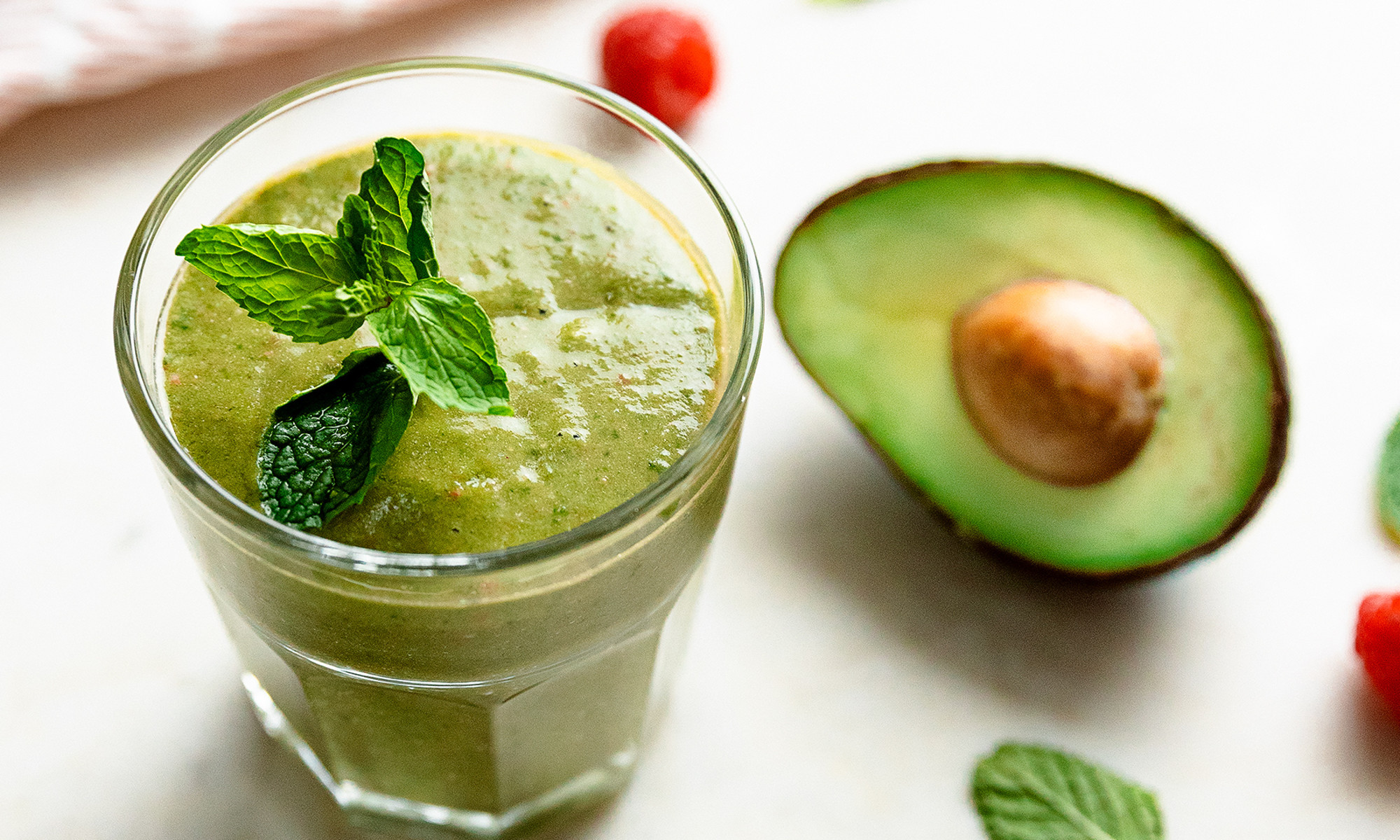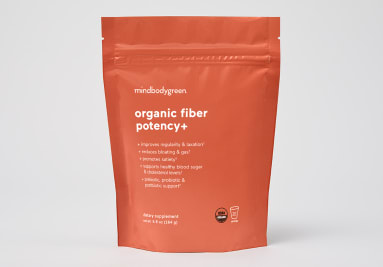Do Your Bowels Need A Morning Wake-Up Call? Try This Fiber-Filled Smoothie
Trust us—your stomach will thank you.


Registered Dietitian Nutritionist
Registered Dietitian Nutritionist
Molly Knudsen, M.S., RDN is a Registered Dietician Nutritionist with a bachelor’s degree in nutrition from Texas Christian University and a master’s in nutrition interventions, communication, and behavior change from Tufts University. She lives in Newport Beach, California, and enjoys connecting people to the food they eat and how it influences health and wellbeing.
September 21, 2023 Being backed up quite frankly stinks (for lack of a better word). It can make you feel uncomfortably full (even if you’re hungry), sluggish, and even a little self-conscious. Just like you likely need an alarm to wake you up and get you out of the house in the morning, your bowels may appreciate a similar wake-up call. If that’s the case, we have the perfect smoothie recipe to both nourish your gut and promptly clear it out in a timely manner. 
Why it's important to prioritize fiber and hydration in the morning
You should know that it’s considered normal to have anywhere from three bowel movements1 a day to three in a week. Although that’s a broad range, less than that is very much considered infrequent. And even if you go every three days, you may feel better on a more daily schedule.
Fiber helps you poop by adding bulk to your stools (because it’s not digested) and regulating the gut transit time (aka how long it takes for food to pass).Foods rich in insoluble fiber can expedite this transit time and attract water into the gut—eventually making it easier for the stool to pass.
Soluble fibers also add bulk to stools and support regularity. Both types of fiber are crucial to optimal digestion. Most fibrous foods contain a combination of these fibers.
But most people aren’t getting the fiber they need. Many U.S. adults only eat around 16 grams a day instead of the recommended 21-38 grams2 (depending on your age and sex).
The #1 tropical smoothie to help you go #2
The ingredients in this smoothie recipe prioritize fiber (to get you a whopping 22 grams!) and water content as well as probiotics and naturally occurring digestive enzymes.*
Ingredients
Serves 1
Method
What makes these ingredients so great for getting things moving?
Now, let’s break down the health benefits of each ingredient.
Papaya, pineapple, and mango
This fruit trio will automatically transport you (at least mentally) to the tropics! Not only is each fruit's flavor profile complementary, but the combo also provide a sneaky amount of water and various digestive enzymes, such as:
These fruits do also add some fiber, but they aren’t the highest-fiber fruits out there (raspberries claim that spot). But that’s okay since our next few ingredients are fiber powerhouses.
organic fiber potency+
mindbodygreen’s organic fiber potency+ packs in an impressive six grams of fiber—primarily from guar beans—in one small scoop.
It's featured ingredient, guar bean fiber, is well-researched and is shown to promote laxation.*
In fact, one study including 49 people experiencing difficult and infrequent poops, found that adding guar bean fiber to their diet accelerated gut transit time11, eased perceived strain on the toilet, and improved the number of weekly bowel movements (yay!).*
This fiber is paired with fiber from an organic mushroom trio, organic green kiwi fruit, and a unique probiotic strain. The probiotic Bacillus subtilis ATCC122264 helps reduce bloat12, aid abdominal comfort, and improve stool consistency.*
And bonus points, because fiber also improves satiety and can help regulate blood sugar.*
So adding a scoop of (did I mention flavorless?) powder to your smoothie can help dull the rise of blood sugar as a result of the fruit’s natural sugars and turn this smoothie into a filling breakfast.*
Avocados
Avocados are another fruit (yes they are technically a fruit) that hides a shocking amount of fiber within its skin.
A half of an avocado provides about 6.7 grams6 of both soluble and insoluble fibers. It also adds healthy monounsaturated fats to your smoothie as well as a lusciously creamy texture.
Celery
Celery is an often overlooked vegetable that seamlessly blends into any smoothie—thanks to it being around 99% water13.
And the part of celery that isn’t water, is likely fiber14.
This recipe gives a pretty conservative celery amount, so if you feel like throwing more in your blender, go for it!
Chia seeds
Just 1 tablespoon of these tiny seeds provides the same amount of fiber as ½ cup of oats (about four grams).
They also contain plant-based omega-3s and just a bit of protein.
When soaked in liquid, chia seeds turn into a pudding consistency. But for smoothies, just toss dry seeds directly into the blender.
Prunes
Lastly, if you’re feeling really backed up, there’s no shame in tossing in a couple of prunes.
While prunes or prune juice may make you think of a grandparent, eating this food is a tried and true way to promote laxation. That’s because they're high in fiber and high in a sugar that helps pull water into the gut.
Functional medicine doctor Elizabeth Boham, M.D., M.S., R.D. previously told mindbodygreen that, "Many people need only three to four prunes to have regular bowel movements."
Making the recipe your own
All the other ingredients in this smoothie recipe can be adjusted to your taste and dietary preferences. If dairy isn’t your thing, opt for a plant-based yogurt or milk. Also, consider enhancing the protein content of this smoothie by throwing in your favorite protein or collagen powder.
The takeaway
Nothing compares to starting your day on a lighter note. And if you’re feeling backed up, the first things you should evaluate are your fiber and water intake.
Smoothies can be a great way to start checking off those boxes right when you wake up. And organic fiber potency+ makes it easy to up the fiber content of any breakfast—including oats and yogurt recipes, too.*
If you are pregnant, breastfeeding, or taking medications, consult with your doctor before starting a supplement routine. It is always optimal to consult with a health care provider when considering what supplements are right for you.

 UsenB
UsenB 


























.jpg&h=630&w=1200&q=100&v=6e07dc5773&c=1)





